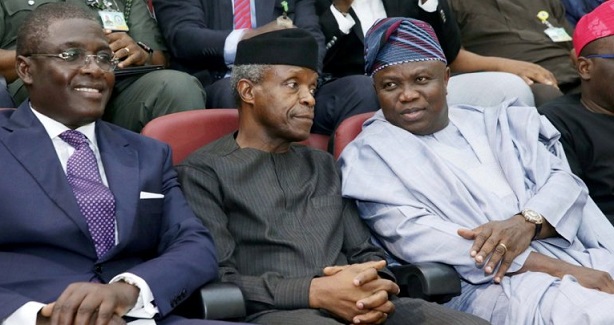Business
Osinbajo explains why Nigeria has high poverty index

Vice President Yemi Osinbajo has attributed the nation’s high poverty population to the neglect of the country’s informal sector.
The informal sector of the economy implies those workers who are self employed, or who work for those who are self employed, as their earnings do not reflect on payrolls, and thus are not taxed.
The Vice President made this known while delivering a keynote address at the Special Parliamentary Session to mark the third anniversary of the 8th Assembly of the Lagos State House of Assembly in Lagos yesterday.
According to him, a larger proportion of the economy, which is dominated by those in the informal sector consisting of petty traders, have income which is often overlooked thereby making the country’s poverty index high.
“One of the reasons why our poverty figures are high is because of our large informal sector consisting of the petty traders whose income does not fit into the extreme poverty bracket but they are counted in a number because there is no way of tracking them up,” the Vice President noted.
Osinabajo said the Federal Government was making plans to expand its micro credit programme to give smaller credit to those in the group.
“We bring them into the formal sector where they have access to government and private credit and we thereby lift more people permanently out of poverty,” he said.
On June 11, Brookings Institute, a nonprofit public policy organization based in Washington DC, United States, published a report citing data from the World Poverty Clock that Nigeria has already overtaken India as the country with the largest population of people living in extreme poverty in early 2018.
But, the Minister of Industry, Trade and Investments, Okechukwu Enelamah, faulted the indices used for the report, saying it might have been compiled when Nigeria was in recession.
Findings by Ripples Nigeria revealed that the World Poverty Clock on its part acknowledged local data access limitations, noting that the harmonized Nigeria living standards survey could have given a better result than the models used.
“For Nigeria, the general household survey (GHS) from 2012/2013 is used, rather than the harmonized Nigeria living standards survey. It is more recent and believed to be of higher quality.
“The challenges in estimating poverty in Nigeria stem from the fact that Nigeria is not a homogeneous country. There are distinct differences in economic conditions between the South and the North.
“National averages conceal these differences and surveys are not sufficiently representative at the State level to draw firm conclusions.
“However, we believe that poverty has fallen over time along with economic growth in Southern states, while it has been more stubborn in northern States. These differences cannot be factored into our national level calculations, although inequality is Nigeria appears to have risen in recent years.
“Nigeria has also been suffering from civil unrest and conflict in selected Northern areas where Boko Haram has been active. Such unrest will indubitably have a negative impact on poverty, but there is insufficient data to quantify,” the World Poverty Clock stated.
Read Also: NBS faults report on Nigeria’s poverty level, says methodology not ‘appropriate’
As at the time of filing this report, the clock estimated that in one minute, while about 44 people in India escape from poverty, about 6 people join extreme poverty population in Nigeria.
According to a data obtained from the platform, 86.99 million Nigerians, representing 44.2 percent of the country’s population, were said to be living in extreme poverty, this is higher than 71.32 million people, representing only 5.3 percent of India’s population, even as the nation is about 7 times as populated as Nigeria.
The Word Poverty Clock was designed to provide real-time poverty estimates of all the countries in the world to monitor progress against ending extreme poverty in the world by 2030.
RipplesNigeria… without borders, without fears
Click here to join the Ripples Nigeria WhatsApp group for latest updates.
Join the conversation
Support Ripples Nigeria, hold up solutions journalism
Balanced, fearless journalism driven by data comes at huge financial costs.
As a media platform, we hold leadership accountable and will not trade the right to press freedom and free speech for a piece of cake.
If you like what we do, and are ready to uphold solutions journalism, kindly donate to the Ripples Nigeria cause.
Your support would help to ensure that citizens and institutions continue to have free access to credible and reliable information for societal development.
























